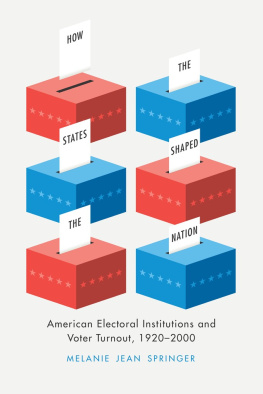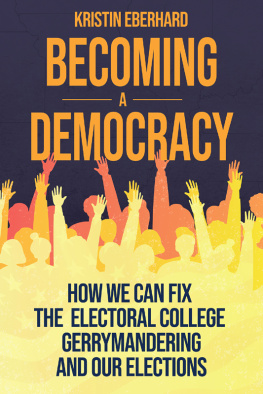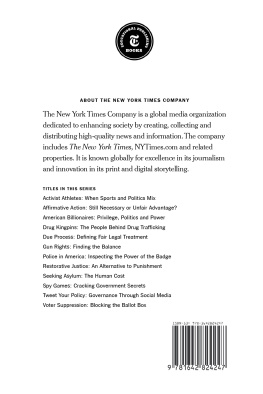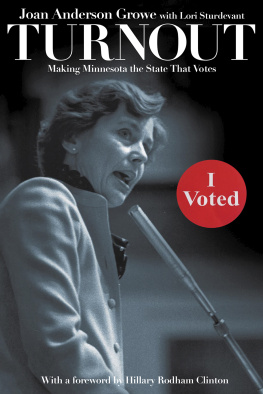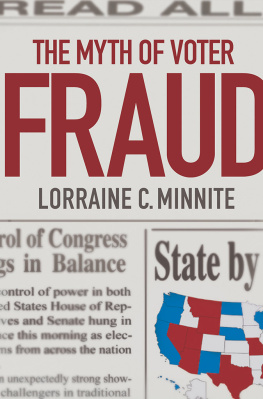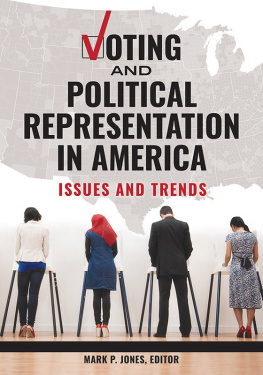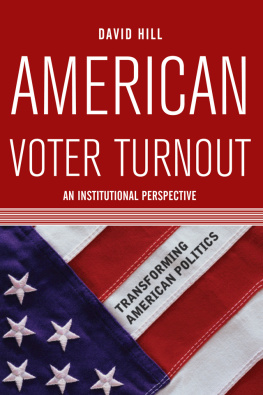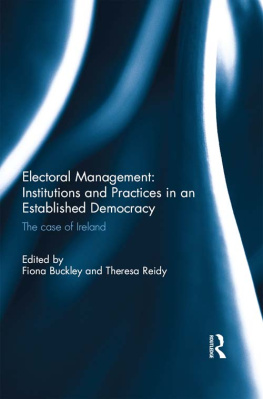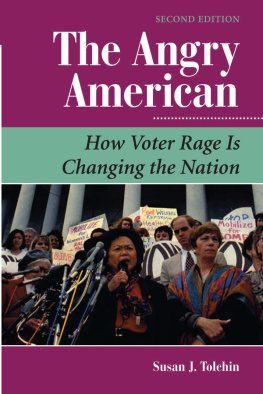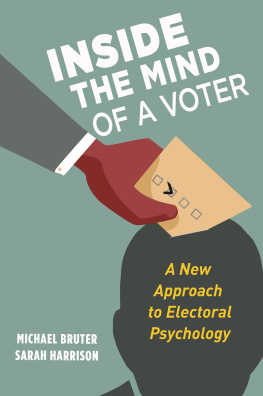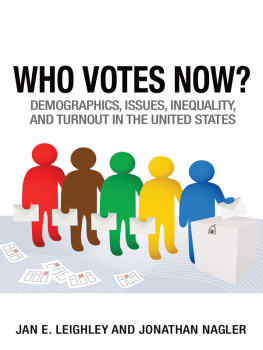Melanie Jean Springer is assistant professor of political science at the University of California, Santa Cruz.
The University of Chicago Press, Chicago 60637
The University of Chicago Press, Ltd., London
2014 by The University of Chicago
All rights reserved. Published 2014.
Printed in the United States of America
23 22 21 20 19 18 17 16 15 14 1 2 3 4 5
ISBN-13: 978-0-226-11418-7 (cloth)
ISBN-13: 978-0-226-11421-7 (paper)
ISBN-13: 978-0-226-11435-4 (e-book)
DOI: 10.7208/chicago/9780226114354.001.0001
Library of Congress Cataloging-in-Publication Data
Springer, Melanie J., author.
How the states shaped the nation : American electoral institutions and voter turnout, 19202000 / Melanie Jean Springer.
pages cm (Chicago studies in American politics)
ISBN 978-0-226-11418-7 (cloth : alk. paper) ISBN 978-0-226-11421-7 (pbk. : alk. paper) ISBN 978-0-226-11435-4 (e-book) 1. ElectionsUnited States. 2. Voter turnoutUnited States. I. Title. II. Series: Chicago studies in American politics.
JK1967.S775 2014
324.973'09dc23
2013025705

This paper meets the requirements of ANSI/NISO Z39.481992 (Permanence of Paper).
How the States Shaped the Nation
American Electoral Institutions and Voter Turnout, 19202000
MELANIE JEAN SPRINGER
The University of Chicago Press
Chicago and London
CHICAGO STUDIES IN AMERICAN POLITICS
A series edited by Benjamin I. Page, Susan Herbst, Lawrence R. Jacobs, and Adam J. Berinsky
Also in the series:
CHANGING MINDS OR CHANGING CHANNELS? PARTISAN NEWS IN AN AGE OF CHOICE by Kevin Arceneaux and Martin Johnson
TRADING DEMOCRACY FOR JUSTICE: CRIMINAL CONVICTIONS AND THE DECLINE OF NEIGHBORHOOD POLITICAL PARTICIPATION by Traci Burch
WHITE-COLLAR GOVERNMENT: THE HIDDEN ROLE OF CLASS IN ECONOMIC POLICY MAKING by Nicholas Carnes
HOW PARTISAN MEDIA POLARIZE AMERICA by Matthew Levendusky
THE POLITICS OF BELONGING: RACE, PUBLIC OPINION, AND IMMIGRATION by Natalie Masuoka and Jane Junn
THE TIMELINE OF PRESIDENTIAL ELECTIONS: HOW CAMPAIGNS DO (AND DO NOT) MATTER by Robert S. Erikson and Christopher Wlezien
LEARNING WHILE GOVERNING: EXPERTISE AND ACCOUNTABILITY IN THE EXECUTIVE BRANCH by Sean Gailmard and John W. Patty
ELECTING JUDGES: THE SURPRISING EFFECTS OF CAMPAIGNING ON JUDICIAL LEGITIMACY by James L. Gibson
FOLLOW THE LEADER? HOW VOTERS RESPOND TO POLITICIANS POLICIES AND PERFORMANCE by Gabriel S. Lenz
THE SOCIAL CITIZEN: PEER NETWORKS AND POLITICAL BEHAVIOR by Betsy Sinclair
POLITICAL TONE: HOW LEADERS TALK AND WHY by Roderick P. Hart, Jay P. Childers, and Colene J. Lind
THE SUBMERGED STATE: HOW INVISIBLE GOVERNMENT POLICIES UNDERMINE AMERICAN DEMOCRACY by Suzanne Mettler
For Joey, my love
ILLUSTRATIONS
FIGURES
TABLES
ACKNOWLEDGMENTS
This book would never have been possible without the steadfast support and encouragement I received from my colleagues, family, and dear friends. I offer my most sincere thanks and appreciation to this tremendous group of people.
First, and foremost, this work benefited greatly from the input of several generous scholars at Columbia University. There is no doubt it was improved by their attention, suggestions, and criticism. I especially thank Bob Erikson, who fostered my interest in voting and elections during my first months in graduate school, and who encouraged this work from the very beginning. I also thank Ira Katznelson for championing and guiding my interest in political history and for his one of a kind insights that never fail to inspire. I also offer my heartfelt thanks to John Lapinski, Rob Lieberman, Bob Shapiro, and Greg Wawro for their guidance during many important moments along the way, and to Mat McCubbins, who urged me to pursue this path in the first place.
After I left graduate school, Saint Louis was my home. I offer my utmost gratitude to my colleagues at Washington University. It was a privilege to begin my career supported by such wonderful scholars and friends. I especially thank Randy Calvert, Bill Lowry, Andrew Martin, Sunita Parikh, John Patty, Steve Smith, and Jim Spriggs for their encouragement and sound advice over the past several years. I also acknowledge the stellar research assistance I received from Morgan Hazelton, and generous funding from the Murray Weidenbaum Center on the Economy, Government, and Public Policy.
This work has evolved greatly thanks to the input of scholars far and wide. Although the individuals who helped shape this book are too numerous to name them all here, I especially thank Chris Achen, Becky Morton, Bob Stein, Caroline Tolbert, and Dan Wirls for their very helpful suggestions. I also thank my good friend and collaborator Elizabeth Rigby, who graciously offered her expertise and never wavered in her enthusiasm for this project.
I also offer my utmost appreciation to John Tryneski, Rodney Powell, the editors of the American Politics Series at the University of Chicago Press, and all the scholars who anonymously reviewed my manuscript. It was an absolute privilege to work with such a supportive team. There is no doubt that their commitment to this endeavor and their invaluable suggestions greatly improved this book. To Rick Valelly, whose sage advice sparked a new direction at a critical time, I am especially indebted. Last, I must convey my immeasurable gratitude to Jamie Druckman, who has been a true mentor since my days as an undergraduate and an unwavering champion of me and my workthank you Jamie.
I also offer my deepest thanks to my incredible family and friends, whose consistent love and friendship has brightened my life infinitely. Specifically, I thank my parents, John and Kathy Beamer, and my sister, Tiffany Campbell, who were my first teachers and encouraged my love of books. I thank Debby Springer, and the rest of my dynamic family, for supporting this pursuit every step of the way. I also acknowledge my father-in-law, Bill Springer, whom I miss dearly. And I thank my amazing friendsMichelle Hall, Guinevere Jobson, Liz Mosco, Gabrielle Muse, and Jocelyn Pietschwho have tirelessly cheered me along throughout this journey and many others. I am so lucky to be able to share my life with each of you.
Lastbut far from leastthere are not enough words to thank my incredible husband and best friend, Joey. You are a remarkable partner. You have supported me endlessly, offered reassurance at every fork in the road, and urged me to persevere when I doubted. You have helped me overcome what seemed insurmountable, and you fill my days with hope and laughter. I am immensely grateful for your constant love, friendship, and unmatched ability to convince and inspire me with your even-handed sensibilities. There is nobody I would rather have by my side. Although it is a small token compared to all that I owe, I dedicate this work to you, Joey. Thank you for always being you, and for always believing in me.
ONE
Introduction
The presidential election held on November 7, 2000, was historic on many counts. One of its lasting legacies was bringing the rules governing American voting to the forefront of political debate and public conversation. This was not the first time the American public had confronted the political ramifications of the countrys variable electoral systems; yet in the aftermath of this now infamous election, Americans were reminded that the federal system allows the individual states to set the electoral rules by which all voters must abide. By design, this system fosters variability while allowing, and perhaps even creating, instances of inequality. The heightened awareness of state power over electoral procedures following the Bush versus Gore election initiated widespread criticism and spurred countless calls for national electoral reform. In the years since, balloting procedures and voting machinery have been closely scrutinized, the availability and convenience of polling places and other voting opportunities have been addressed, and restrictions such as voter identification requirements have been added. In each instance the individual states have been the major political players, shaping the who, when, and where of voting as they see fit.
 This paper meets the requirements of ANSI/NISO Z39.481992 (Permanence of Paper).
This paper meets the requirements of ANSI/NISO Z39.481992 (Permanence of Paper).
